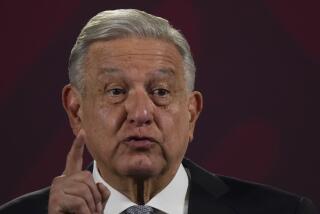Lawmakers Back Limits on Aquino’s Powers
- Share via
MANILA — Lawmakers Wednesday approved a bill affirming President Corazon Aquino’s emergency powers imposed during a coup attempt but limiting them to three months and rejecting some tough measures proposed to restore order.
Aquino declared an indefinite state of emergency Dec. 6 and this week asked Congress to grant specific powers under the declaration.
The bill approved Wednesday by the House of Representatives limits the powers to 90 days. The Senate version could extend them up to six months. The Senate will resume debate on its version today.
Renegade troops surrendered their last stronghold Saturday after at least 113 people died in the rebellion that began Dec. 1. However, authorities say about half the estimated 3,000 troops who supported the uprising are still at large.
Both congressional bills would let authorities search for weapons and ammunition in private homes without normal legal constraints.
But searches and seizures would be “in the context of constitutional guarantees” under the House version, meaning a warrant would be required, said Rep. Edcel Lagman, sponsor of the amendment.
Another amendment says measures to put down the rebellion must be “within the protection of the bill of rights.”
The House voted against letting Aquino intervene in labor disputes and suspend labor laws. The Senate version would keep the provision, which critics regard as a virtual ban on strikes.
Aquino said she needed stronger powers to search for weapons and rebels still at large. Business groups asked for curbs on strikes to enhance confidence among investors.
Sen. Juan Ponce Enrile denounced Aquino’s emergency decree as a move toward dictatorship. Former human rights lawyer Sen. Rene Saguisag defended it because of the coup attempt.
Emergency powers also could be used in extending the lease on the U.S. military bases in the Philippines and approving them would have “dire implications” for civil liberties, said Enrile, a defense minister and martial law administrator under President Ferdinand E. Marcos from 1972 to 1981.
Enrile broke with Marcos and joined a popular uprising that installed Aquino as president in February, 1986, and drove Marcos into exile in Hawaii, where he died. Enrile later joined the opposition to Aquino.
Defense Secretary Fidel V. Ramos said Wednesday that rebels who attempted the coup are still capable of staging attacks and assassinations. He said the government will no longer seek U.S. air cover over Philippine territory.
More to Read
Sign up for Essential California
The most important California stories and recommendations in your inbox every morning.
You may occasionally receive promotional content from the Los Angeles Times.













